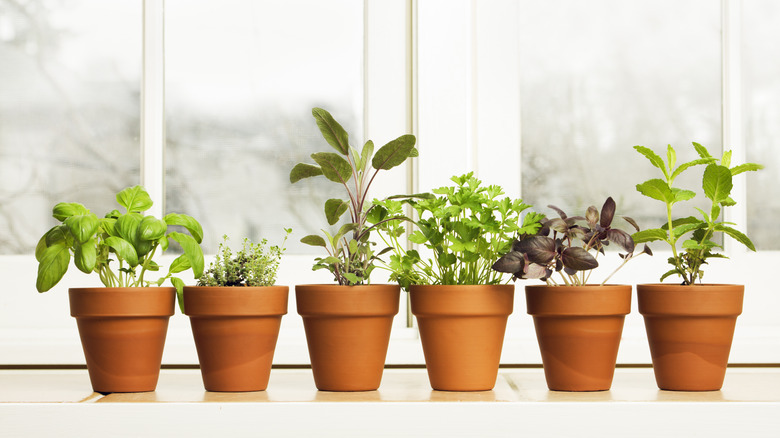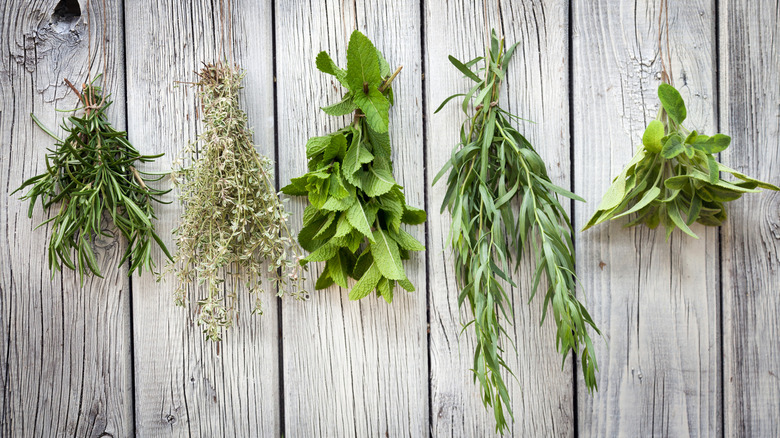What To Do With The Fresh Herbs In Your Garden Before The First Frost
One of the best parts of summer and the warmer months for gardeners is tending your plants and reaping the benefits of growing your own food. There truly is nothing like heading into the backyard to snip some fresh basil to make your own pesto or adding fresh parsley or chives for a pop of color to your dinner. That being said, once the weather turns to fall, it's time to start planning to salvage what's left of your herb garden in order to save them before the first frost dashes any hopes of spicing up your food with fresh greens from the garden.
Some herbs are perennials and will return each spring, even if left outside throughout the winter. Of course, this will depend on which growing zone you live in as some prefer a milder winter while others are more hardy. Of the hardiest crew, mint, lemon balm, and chives are viable in zones 3 or higher and will return each spring. In zone 4, oregano, sage, and tarragon are hardy perennials. At zone 5, lavender and thyme will survive while rosemary, marjoram, and cilantro can only weather well in zone 6 or higher. While these are typical survival guides for these herbs, it doesn't hurt to take cuttings of your favorite herbs to root in water and enjoy throughout the winter. The cuttings can always be transplanted in your garden again once the warmer weather returns as well.
Herbs you should winter inside & how to do it
Not all herbs are created equal, and some simply cannot survive the natural elements throughout the winter. So whether your herbs are annuals or simply cannot survive perennially in your frigid winters, it's not a bad idea to transplant your favorite greens and bring them inside to cozy up near a sunny window. The top contenders for wintering inside are basil, lemon verbena, oregano, and dill. While some of these can survive mild winters outside, they are easily transplanted and will grow well in a sunny spot in your home.
Before you get ready to bring your herbs inside before the frost, it's always best to examine your plants for pests or diseases to avoid spreading them to your indoor plants. Once you've determined your plants are ready to be brought in, there are a few methods you can follow. The easiest is planting your herbs in moveable containers that can be brought back and forth from your patio to a warm, sunny spot in your home. This requires the least amount of effort and is least invasive to your plants. Next would be taking cuttings of the plants, rooting them in water, and planting them in potting soil in containers that can then serve as plants ready to be plopped into the garden come spring. Finally, you can carefully dig up any of these herbs to transpot inside, though this does pose some danger to the plant's roots.
Herbs you should salvage before the frost
While some herbs can winter outside and some can be transpotted, perhaps all the effort isn't in your wheelhouse, or you'd like to just start from scratch next year. If that's the case, you'll want to harvest what's left of your plants before the frost destroys any remaining leaves. Perennial plants you plan to leave out during the winter are best to salvage completely and store through the colder months for culinary uses. Rosemary, oregano, and sage, for example, can be trimmed back to a third of their size to prepare for the spring. Basil, which cannot winter outside, is another great herb to harvest as it's quite versatile and is prone to shriveling up in cooler weather.
If you have larger plants, using buckets of rosemary or basil may seem unfeasible — not to mention the shelf life of these herbs is limited. Extend the life of your cuttings by placing the stems in water. Be sure to remove any leaves that touch the water to avoid the growth of bacteria. Moreover, another great option is to dehydrate the herbs, either at a very low setting in your oven or using the dehydrator function on your air fryer. This method is excellent for creating your own dried herbs for culinary endeavors and will elongate the use of your herbs throughout the winter. Nonetheless, there are great options to enjoy the fruits of your labors during the colder months.


